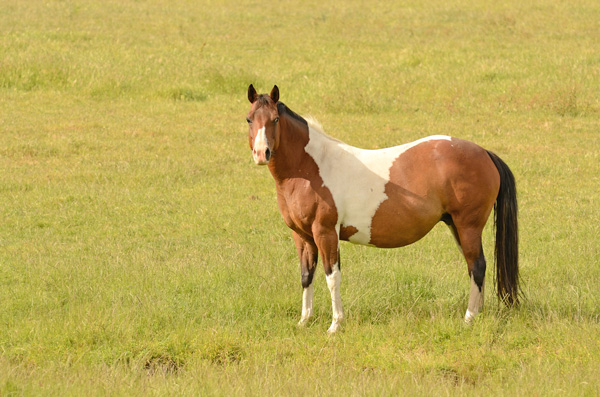Many riders complain about dealing with “too much horse” when on a grain diet, and then the horse intimidates the rider and receives less exercise, creating a vicious cycle. It may help to eliminate all grain to see if your horse is more relaxed and better mannered with a longer attention span. (In this discussion, grain refers to corn, oats and barley, with or without molasses.)

However, it’s an oversimplification to eliminate “high” sugar feeds from all horse diets–some horses need relatively high non-structural carbohydrates (NSC) levels to fuel their type and level of performance.
Individual horses vary in their blood sugar (glycemic) and insulin responses to a meal. Many recreational horses don’t need the sweet in their feed, yet feeding low NSC is not a “one size fits all” situation. Choice of a commercial, low-NSC product should account for more than just the presence or absence of sugars. It is important to evaluate the nutrient content of the total diet rather than only a single ingredient.
Some facts about grains are relevant to horse health: Grains aren’t well digested in the small intestines and as they enter the hindgut, they ferment to create various problems. The best advice is to limit grain meals to no more than 0.4 % of a horse’s body weight (4 pounds of grain for a 1,000-pound horse at one feeding). If your horse needs extra calories to maintain body condition, offer small quantities 3-4 times per day, with at least five-hour intervals between grain feedings. Weigh grain rather than feeding by volume. Limit or eliminate grain when possible, and offer an alternative hi-calorie food source as a grain substitute, such as any of the following:
- Fat is a safe and concentrated energy source and is well digested by horses. Fat can be fed as vegetable oil, rice bran or is available in commercially formulated high-fat feed. Two cups of oil is the caloric equivalent to 3.3 pounds of oats, 2.6 pounds of corn, or 2.5 pounds of sweet feed.
- Complete feed pellets contain 25% grain mixed in a concentrated, readily digestible form of fiber. These are safe to feed in addition to or substituted for some hay.
- Beet pulp is a fiber-based energy food to substitute for a portion of hay. Beet pulp, without added molasses, maintains a horse’s glycemic response in a safe range. Up to a pound of beet pulp (dry weight then soaked to volume) can be fed daily with no adjustments made to the amount of hay fed. Each additional pound of beet pulp fed can substitute for 1.5 pounds of hay.
You will probably find that your horse holds his weight well, performs well, and is more relaxed when fed alternative hi-calorie feeds instead of grain.



